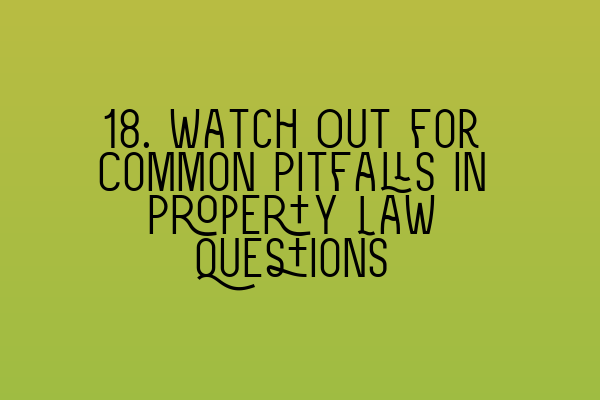18. Watch Out for Common Pitfalls in Property Law Questions
Property law is a complex and intricate field that requires a deep understanding of legal principles, rules, and regulations. As a solicitor, it is important to be well-versed in property law to provide accurate advice and representation to clients. However, when it comes to property law questions, there are common pitfalls that you should watch out for. In this blog post, we will discuss some of these pitfalls and provide valuable insights to help you navigate your way through property law questions.
Pitfall 1: Neglecting to analyze all relevant legal principles
One of the most common pitfalls in property law questions is failing to analyze all relevant legal principles. Property law encompasses various concepts, such as estates, interests, easements, covenants, and leases. To answer property law questions effectively, it is crucial to identify and analyze the relevant legal principles that apply to the given scenario. By carefully examining the facts and applying the appropriate legal principles, you can provide a well-reasoned and accurate response.
Pitfall 2: Overlooking case law and statutory provisions
Another common pitfall is overlooking case law and statutory provisions. Property law is not only governed by statutes but also shaped by judicial decisions. When faced with a property law question, it is important to consider both the relevant statutes and any applicable case law. By referring to relevant precedents and statutory provisions, you can support your analysis and provide a more comprehensive answer.
Pitfall 3: Failing to spot potential issues and conflicts
Property law questions often involve complex scenarios with potential issues and conflicts. Failing to spot these issues can lead to incomplete or inaccurate answers. It is essential to carefully review the question and identify any potential conflicts or challenges that may arise. By addressing these issues head-on and providing a balanced analysis, you can demonstrate your proficiency in property law and strengthen your argument.
Pitfall 4: Lack of clarity and structure in your answer
Clarity and structure are paramount when answering property law questions. Your response should be well-organized and easy to follow. Start by providing a concise introduction to establish the context of the question. Then, break down your answer into clear sections, focusing on each relevant legal principle or issue. Use headings and subheadings to guide the reader and make your response more structured. This will not only enhance the readability of your answer but also help you present your arguments in a logical and coherent manner.
Pitfall 5: Insufficient explanations and analysis
Simply stating the legal principles without explaining their application or analyzing the facts will not suffice in property law questions. To provide a strong answer, it is crucial to explain the rationale behind your assertions and analyze how the legal principles apply to the specific scenario. Use examples, case law, and statutory provisions to support your arguments and enhance your answer’s credibility. This level of depth and analysis will demonstrate your understanding of property law and showcase your ability to apply legal principles in practical situations.
Conclusion
Navigating property law questions can be challenging, especially when faced with common pitfalls. However, by being aware of these pitfalls and following the tips provided in this blog post, you can overcome these challenges and provide well-reasoned and accurate answers. Remember to analyze all relevant legal principles, consider case law and statutory provisions, spot potential issues and conflicts, maintain clarity and structure in your answer, and provide sufficient explanations and analysis. By doing so, you will set yourself apart as a knowledgeable and competent property law solicitor.
If you’re looking for more practice and preparation resources for the SQE exams, check out our related articles:
- SQE 1 Practice Exam Questions
- SQE 1 Practice Mocks FLK1 FLK2
- SQE 2 Preparation Courses
- SQE 1 Preparation Courses
- SRA SQE Exam Dates
At SQE Property Law & Land Law, we provide comprehensive training and preparation courses for the SQE exams. Our experienced tutors and extensive resources will ensure that you are well-equipped to excel in the property law section. Contact us today to learn more about our courses and start your journey towards becoming a successful property law solicitor.
